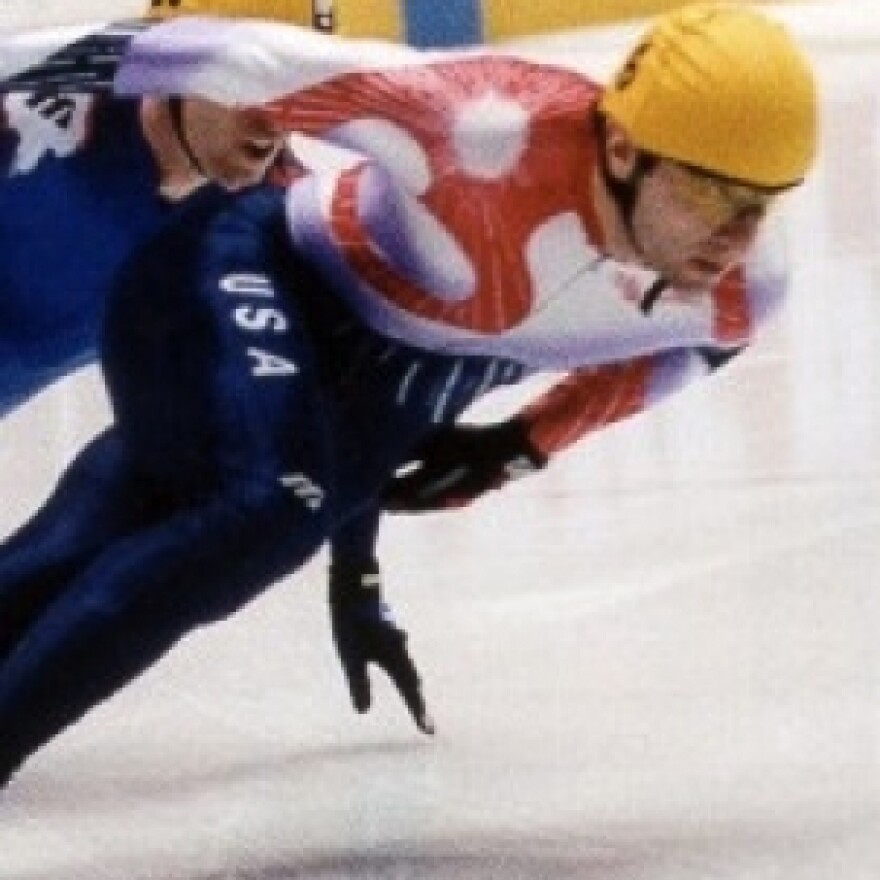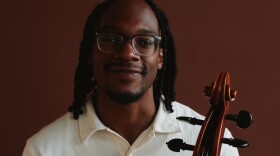This story has been updated as of Saturday, 3 PM.
Four-time Olympian and former head of U.S. Speedskating Andy Gabel has admitted to and apologized for what he calls "a brief, inappropriate relationship with a female teammate," according to an interview with the Chicago Tribune.
Speedskater Bridie Farrell told Lake Effect exclusively on Thursday that she was sexually abused by Gabel more than a decade ago, when she was 15 and he was 33. In his interview with the Tribune, Gabel says they did not have sex, but he knows the relationship was wrong.
Farrell, who trains at Milwaukee’s Pettit National Ice Center, says the sexual contact happened repeatedly over a period of several months in 1997 and 1998 in Saratoga Springs and Lake Placid, New York, and Marquette, Michigan.
Gabel, a graduate of Marquette University, trained for years in the Milwaukee area and later served as President of U.S. Speedskating, the governing body for the sport in this country. He won a silver medal at the 1994 Olympics as part of a U.S. short-track relay team.
Gabel has not returned our repeated requests for comment, though he has provided statements to other media outlets. Lake Effect decided to name Gabel in the story, based on corroborating evidence provided, the characterization of other evidence in the case, and because the name is integral to the story. (Gabel, pictured at right, U.S. Speedskating photo)
U.S. Speedskating released a statement Thursday night saying it will begin investigating the allegations, and it had no prior knowledge of these allegations before the interview ran.
"We intend to look into this matter immediately to determine what action should be taken. We will not have any further comment on this matter until we have more facts," the statement says.
Thursday's interview marks the first time Farrell has spoken publicly about what she says occurred. The statute of limitations for Farrell to file a civil suit related to the matter has expired, and Farrell says she is only speaking out now to affect system-wide change and help others who have gone through abuse.

“My purpose in speaking is to change the culture of sport,” she says. “And make it a safer place. Make it something we can talk about.”
U.S. Olympic Committee CEO Scott Blackmun expressed his support via a released statement on Friday of Farrell's decision to tell her story.
“In sport as in life, we have a duty to do everything we can to protect our children from abuse at the hands of adults," the statement says. "We are glad that Ms. Farrell chose to tell her story, because it will make others who have been abused aware that they are not alone, and hopefully shine a light on the resources that are available to administrators, coaches, parents and athletes to help protect our young athletes."
Farrell compares the secrecy surrounding sexual abuse to the secrecy that once surrounded breast cancer. “But now we can talk about it. Those women did not choose to have breast cancer. [People who have been sexually abused] did not choose this.”
Farrell says she was 15-years-old when the abuse began, and Gabel was 33. She describes him as a mentor who advised her on everything from training, to nutrition, to taking care of her skating equipment. In the interview, Farrell says she suspected from the beginning that their contact was inappropriate.
“I knew it was always wrong, and I knew that because he made it be a secret," she says. "But I will say that the 15-year-old thought it was exciting. The fifteen-year-old was starstruck.”
For years, she told no one about what she had gone through.
“The first five to seven years after it happened, I was scared,” she says. “I was petrified, because I was young and in speedskating, and I was knocking on the door to the junior national team, then the senior national team, and I didn’t want to do anything to jeopardize that.
"Then, there was a period of my life when I didn’t say anything because I realized I was hurt, and I was broken,” she adds. “And it took a long time and a lot of work and some pretty dark times to come to grips with it and put myself together.”
And so why is she speaking now, at this point in time?
“Because it happened to me, but it doesn’t define me,” she says. “And I am a strong person, and I’m confident, and I’m not scared of him, or anyone, or anything.”
She says she doesn’t expect her story to face a legal challenge, because “I’m telling the truth, and I’m not out to get him.” If it rose to the level of a court hearing, Farrell says, “I would bring the evidence I have, and it would be a quick show.”
Farrell says it was 2007 before she first talked about what she says took place, telling selected family members several years later. She says it has just been in recent months - since she decided to return to the sport after a six-year absence - that she has begun talking more openly.
“I wanted to be close and real with friends in skating, but there was this big secret and there was this big part I wasn’t disclosing. And in order for me to be honest and truly be friends with these people, I needed to be able to say, ‘This is a huge thing I’m battling.’”

She says she’s told a handful of fellow skaters, and she says doing that has made it possible for her to return to the sport after years in which she couldn’t bear to go to an ice rink.
In retrospect, Farrell says she was let down by a system she says did not make it possible for her to come forward sooner - a system that included speedskating, her high school, and even her family. But she says she believes there are more resources available today for athletes who may be being abused.
“Kids have smart phones and iPads and everything, and we talk about how kids have access to things we don’t want them to have, but they can also have access to things they need to.”
She points specifically to the U.S. Olympic Committee’s Safesport program, as well as the Women's Sports Foundation, as vital resources. Her biggest regret, Farrell says, is waiting so long to tell her story.
“I wish I had said something the day that it happened,” she says. “And if that person didn’t believe me, that I told somebody else, and somebody else, until someone listened.”
From an early age in Saratoga Springs, Farrell was an elite-level short-track speedskater. She came close, but fell short of making the U.S. Olympic team in 1998, 2002, and 2006. The abuse she alleges had nothing to do with failure to reach the Olympics, she says. But she says it led to depression and problems with an eating disorder. Farrell left the sport after her 2006 effort.
Her effort to make the Olympics as a long-track racer today will be an uphill battle - she currently holds no ranking in the sport. She skated this weekend in the AmCup Long Track Speedskating Final at the Utah Olympic Oval (see photo), and set personal bests and seasonal records in each race she entered. She still hopes to make the U.S. Olympic team headed to Sochi next year.
You can find a transcript of the interview with Bridie Farrell here.





